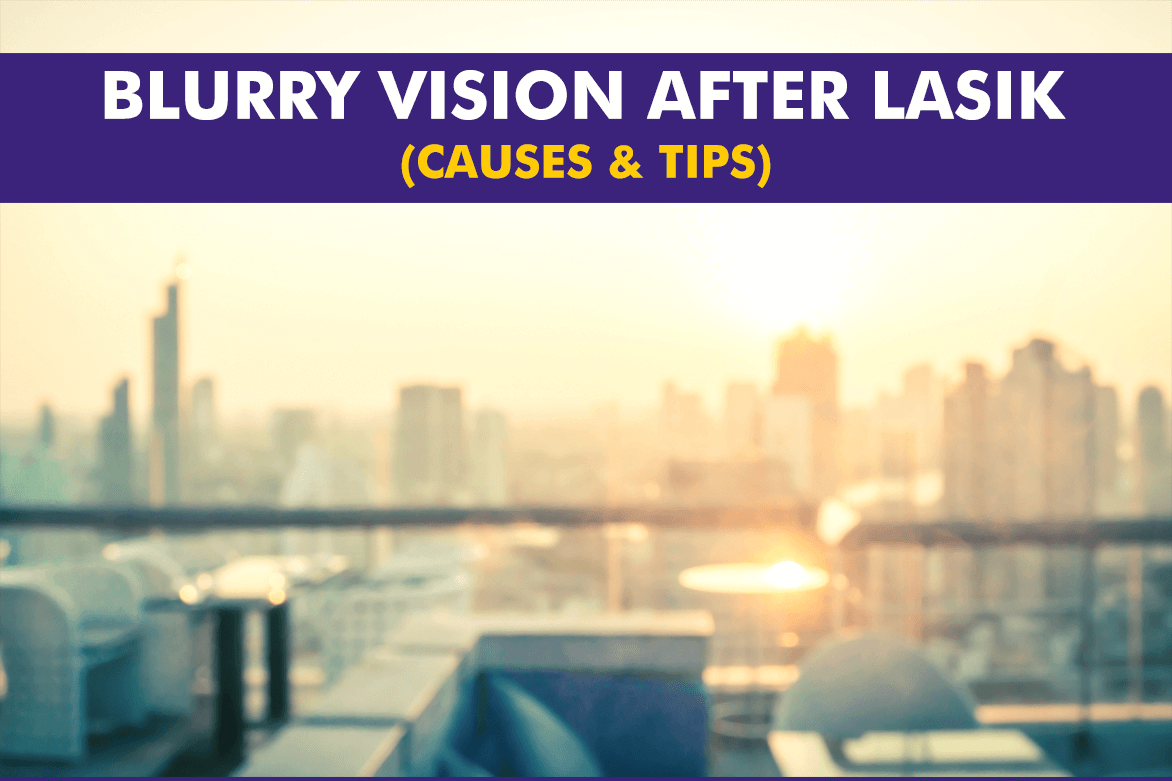
Blurry Vision After LASIK Surgery – Causes & Tips

After shelling out a considerable amount of money on LASIK surgery, the last thing anyone wants is to face a setback like blurry vision. The dream is simple: ditch those glasses and contact lenses for good and wake up to a world seen in crystal-clear high definition. Yet, for a few, experiencing a hazy vision after LASIK is a reality. So, why does blurry vision after LASIK happens? Let’s answer this question, looking at the potential causes of this issue, and providing practical tips for managing and potentially resolving it.
Blurriness After LASIK
LASIK is a laser eye procedure designed to correct vision problems such as nearsightedness, farsightedness, and astigmatism, and has become a ray of hope for many seeking a life free from hassles of glasses or contact lenses. However, encountering hazy vision after LASIK can dampen this newfound visual freedom, leading to concerns.
Experiencing blurriness after LASIK can certainly set off alarm bells in your mind, but it’s often not a red flag for concern. This common post-surgical symptom usually falls under the “normal” category, as your eyes adjust and heal from the procedure. The journey to optimal vision can sometimes include a bit of a blurry detour, thanks to factors like dry eyes, the natural healing process, or minor residual refractive errors that your eyes are still settling into.
While patience is key, it’s also important to stay in touch with your surgeon, attending follow-up appointments to monitor your progress. These check-ins can reassure you that your recovery is on track or identify if there’s a need for any additional intervention. So, while a hazy vision after LASIK is expected, keeping an open line of communication with your eye care professional will ensure you navigate this phase with confidence, ultimately leading to the clear vision you’ve been anticipating.
Early Signs of Blurry Vision After LASIK
Entering the post-LASIK phase, it’s quite normal to observe some initial changes in how you see the world around you. Being aware of these early indicators can not only keep you well-informed but also assist you in smoothly transitioning through this period. Let’s explore some of the blurry vision causes after LASIK:
- Blurry Vision: Right after the procedure, it’s possible to find that things aren’t as crystal-clear as anticipated. Your vision may seem fuzzy or veiled, complicating your ability to see fine details sharply.
- Halos and Glare: If you notice halos around lights or find light sources to be overly bright, causing discomfort, know that this is a common occurrence post-LASIK, particularly noticeable at night.
- Fluctuations in Vision: You might experience a hazy vision after LASIK, where your vision shifts from clear to blurry. It’s as though your eyes are calibrating themselves to their new condition, experimenting with and adjusting to different levels of focus.
- Difficulty to See in Low Light: Seeing in dim light might seem more difficult than usual shortly after your surgery. This stage is temporary, with improvements in night vision expected over time.
- Increased Light Sensitivity: Post-surgery, your eyes may become unusually sensitive to light, making it tough to endure bright environments or direct sunlight.
- Feeling of Eye Strain or Tiredness: An occasional sense of strain or weariness in your eyes may occur, which can lead to moments of hazy vision after LASIK.
What Causes Blurry Vision after LASIK Surgery?
After the excitement of undergoing LASIK surgery for vision correction, encountering blurriness after LASIK can feel like an unexpected twist in the journey towards clear sight. Although LASIK boasts a high success and satisfaction rate, blurry vision after LASIK is not uncommon for patients to face some degree of blurriness during their recovery. This occurrence, while typically temporary, stems from a range of factors that are integral to understanding and navigating the post-LASIK healing process. Let’s explore most common blurry vision causes:
-
Dry Eye
One of the most common blurry vision causes is dry eye syndrome. The surgery can temporarily disrupt the nerve signals responsible for tear production, leading to insufficient lubrication on the surface of the eye. This lack of tears causes visual disturbances and discomfort, contributing to a hazy vision after LASIK. Regular use of artificial tears and following your doctor’s advice on managing dry eyes can alleviate this condition.
-
Improper Healing
The healing process after LASIK varies from person to person. Improper or uneven healing of the cornea can lead to irregularities on its surface, affecting how light is refracted into the eye and resulting in blurry vision after LASIK. Close monitoring by your surgeon and adherence to post-operative care instructions are crucial for healthy healing.
-
Certain Medications
Some medications can exacerbate dry eye symptoms or affect vision directly, leading to a hazy vision after LASIK. It’s important to inform your surgeon about all medications you are taking, so they can advise on potential impacts on your LASIK recovery and whether any adjustments are needed.
-
Swelling
Post-operative swelling or inflammation of the cornea can also cause blurry vision. This is usually a temporary issue that resolves as the swelling goes down. Anti-inflammatory medications or eye drops prescribed by your surgeon can help reduce swelling and improve blurriness after LASIK.
-
Corneal Flap Issues
During LASIK surgery, a thin flap is created on the cornea. If this flap does not heal properly or if there are complications such as wrinkles or displacement, it can lead to blurriness. Immediate attention from your surgeon is required to correct any flap issues and restore clear vision.
-
Regression
In some cases, patients may experience regression, where the eye slowly shifts back towards its original prescription. This is more likely to occur in individuals with high prescriptions before LASIK. Regression can result in a gradual return of blurry vision after LASIK. Although relatively rare, it’s a possibility that can be addressed with an enhancement procedure or additional treatments as recommended by your eye care professional.
You can also read on Pros and cons of Lasik Eye Surgery
Some other reasons causing Blurry Vision after LASIK Surgery
Blurriness after LASIK surgery is not exclusively linked to the procedure itself. Several underlying conditions can also contribute to a hazy vision after LASIK. It’s crucial for patients to be aware of these potential issues, as they may affect the long-term outcomes of LASIK.
-
Cataract Development
While LASIK is a procedure focused on the cornea, the natural aging of the eye can lead to the development of cataracts, which can cause blurry vision after LASIK.
-
Keratoconus Spectrum
Keratoconus is a progressive eye disease where the cornea thins and begins to bulge into a cone-like shape, distorting vision. LASIK surgery can sometimes hasten the progression of keratoconus in patients who are predisposed to it, leading to blurriness and other vision issues.
-
Macular Degeneration
Age-related macular degeneration (AMD) affects the macula, the part of the retina responsible for sharp, central vision. While LASIK corrects the shape of the cornea, it does not address issues in the retina. Therefore, patients with undiagnosed AMD may notice blurriness after LASIK as the condition progresses independently of the surgery.
-
Diabetes-Related Eye Conditions
Diabetes can lead to several eye conditions, including diabetic retinopathy, which affects the blood vessels of the retina and can cause blurry vision post LASIK.
What does blurred vision following LASIK surgery feel like?
Blurry vision post LASIK surgery often feels like a veil has been draped over your surroundings, with objects and details losing their sharpness and appearing hazed. It’s akin to trying to see through a foggy window, where everything seems slightly out of focus, making it difficult to pinpoint fine details. This hazy vision after LASIK is generally temporary, a transient side effect as your eyes adjust to their new shape and begin the healing process, gradually clearing up to reveal crisper, clearer vision.
How Long Will My Vision Be Blurry After LASIK?
This temporary hazy vision after LASIK typically resolves within the initial few weeks. Nonetheless, it could take around 2 to 3 months for your vision to fully stabilize and for your eyes to heal thoroughly.
How To Manage Blurry Vision After LASIK?
To manage blurry vision after LASIK, you need to take care of your eyes post-LASIK surgery:
- Follow Post-Operative Instructions: Adhere strictly to your surgeon’s guidance for optimal healing.
- Rest Your Eyes: Give your eyes ample time to recover by avoiding strenuous activities.
- Use Prescribed Eye Drop: Apply medication and lubricants as directed to aid in healing and comfort.
- Avoid Rubbing Your Eyes: Prevent potential damage and complications by keeping your hands away from your eyes.
- Use Artificial Tears: Keep your eyes lubricated and soothe dryness with over-the-counter eye drops.
- Avoid Eye Strain: Minimize activities that could tire your eyes, like prolonged screen time.
- Use Corrective Lenses if Needed: Wear glasses or contact lenses as advised by your doctor for temporary visual support.
- Visit Your Eye Doctor: Ensure regular check-ups to monitor your healing progress and address any concerns.
The thing to keep in mind Before and after LASIK Procedure
How to Prevent Blurry Vision Post LASIK
Preventing blurry vision post LASIK largely involves careful preparation before the surgery and diligent care afterward. By taking these preventive measures, you can enhance your chances of a smoother recovery and reduce the likelihood of experiencing blurry vision after LASIK surgery:
- Ensure a comprehensive eye examination to identify potential issues before surgery.
- Select a skilled and reputable LASIK surgeon to reduce the risk of complications.
- Adhere to pre-surgery guidelines, especially regarding contact lens wear.
- Use protective eyewear as recommended to shield your eyes post-surgery.
- Support your body’s healing with good nutrition, hydration, and adequate rest.
- Stay vigilant about your vision changes and report any significant changes to your surgeon promptly.
Expert Tips to Treat Blurry Vision After LASIK
- Enhance your living and work spaces with humidifiers to alleviate dry eye symptoms contributing to blurry vision.
- Minimize eye strain by implementing the 20-20-20 vision rule—every 20 minutes, take a 20-second break to look at something 20 feet away.
- Incorporate omega-3 fatty acids, vitamins C and E, and zinc into your diet to support eye health and aid recovery.
Experiencing blurry vision after LASIK can feel like a plot twist in your vision correction journey. But with a little patience, care, and a few lifestyle tweaks, you’ll likely find yourself on the other side with the clear vision you’ve been dreaming of. And remember, if the blurry vision post LASIK persists or you’re feeling uneasy, your surgeon is just an appointment away from providing the reassurance or help you need. Here’s to clear skies and even clearer vision ahead!
You can also read on Benefits of Lasik Surgery
FAQs
Why do I have blurry vision after LASIK surgery?
Blurry vision post-LASIK is often due to the healing process, dry eyes, or temporary side effects like corneal swelling.
How long after LASIK will blurry vision go away?
Blurry vision typically improves within a few days to weeks, but it can take up to 3-6 months for complete stabilization.
When should I contact my eye surgeon if I experience blurry vision after LASIK surgery?
If blurry vision persists beyond the expected recovery period, worsens, or is accompanied by pain or significant discomfort, contact your surgeon immediately.
